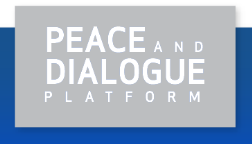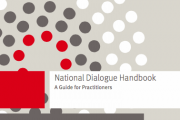Dialogue Process
Although there is no standard definition, dialogue is often conceptualized as the process of people coming together to build mutual understanding and trust across their differences, and to create positive outcomes through this process. When used in the right context and with the appropriate methods, a dialogue process allows new realities and innovative solutions to unfold.
Dialogue processes can range from inter-personal local level type of engagement, to multi-stakeholder, high level international peace processes; there is no one-size-fits all approach. Dialogue is an adaptive tool that can be used as a preventative measure, during a conflict as a bridge-builder and post-conflict as a potential reconciler and beyond.
What is the importance of dialogue?
Dialogue is an inclusive process that can bring together a diverse set of voices to create a microcosm of the larger society. To bring about sustainable change, people have to develop a sense of joint ownership of the process and become stakeholders in identifying new approaches to address common challenges.
Dialogue entails learning, not just talking. It should be viewed as a transformative process that can change the way people talk, think and communicate with one another. Unlike other forms of discussion, dialogue requires self-reflection, spirit of inquiry and personal change to be present. Participants must be willing to address the root causes of a crisis, not just the symptoms on the surface.
Democratic Dialogue
Democratic dialogue is an approach that strengthens democratic institutions by providing citizens with the opportunity to voice their concerns, needs and interests—especially people who are normally disempowered from expressing themselves. Democratic dialogue seeks to transform conflictive relationships so as to prevent crises and violence and therefore, contribute to enhance democratic governance. The goal of democratic dialogue is not merely to exchange information, but rather to transform through dialogue. In societies characterized by complex networks with conflicting interests the challenge is not to avoid conflict but to transform it altogether, while strengthening legitimate social structures and preventing violence. Democratic dialogue allows us to address this challenge when applied as a tool for change and for building consensus so as to balance power in society and open new channels of access and participation for citizens.
More here
Access the Peace and Dialogue Platform

The Peace & Dialogue Platform is a collaborative online space and shared knowledge resource for peace and dialogue processes and structures. It offers a dynamic platform for joint knowledge creation, and a structured space to share experiences and capture unfolding processes.

